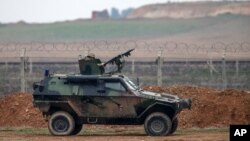Washington and Ankara are close to signing a security deal to improve cooperation in stemming the threat of groups like the Islamic State (IS). In the face of strong criticism from its allies, Ankara has in the past few weeks stepped up its efforts to stop would-be jihadists from entering Syria to join the ranks of IS. But doubts remain over Ankara’s priorities.
The proposed security deal between Washington and Ankara, according to U.S. Ambassador to Turkey John Bass, is aimed at improving cooperation and information-sharing between the two countries' security forces in the battle against the IS.
Ankara has faced criticism from the media and even its allies that it has allowed the country to become a "jihadist highway" to Syria. Such accusations have been staunchly denied by the Turkish government, which in turn has blamed its allies for failing to stop jihadists from leaving their home countries.
But diplomatic columnist Semih Idiz of Taraf newspaper and Al Monitor website says in the past few months Ankara has appeared to change policy, by stepping up the arrest and deportation of would be jihadists.
"If you ask Turkish officials, they will say, 'it's the same all along.' But I do think there is a change. I think initially they started off [with a] slight blind eye to groups like al-Nusra, assuming that these would get rid of Assad,"
According to reports, one of the key parts of the planned security deal is to improve intelligence sharing. Ankara has repeatedly complained of the failure of its allies to provide timely information of would-be jihadists heading to Turkey.
Despite the growing number of jihadist detentions and subsequent deportations, which have been widely publicized by Turkish authorities, suspicions remain over Ankara’s commitment to cracking down on IS, says Soli Ozel, who teaches international relations at Istanbul’s Kadir Has University.
"Turkey is doing a lot more than it did before, but there was this piece of news in The New York Times about fertilizer that can be used as explosives being freely sent to IS-held territories. So obviously this is not very stringent embargoing against IS at all,” said Ozel. “I don't think IS is [Turkey’s] priority. I still think there is [a] difference between the Turkish [and] American approach. I am not sure it can bridged soon," added he.
Disagreement over who’s the problem
Ankara remains critical of Washington over its priority in fighting the Islamic State, arguing the source of instability in the region is Syrian President Bashar al-Assad. The dispute has hampered the U.S.-backed project of training Syrian rebels to fight IS. Under an agreement signed in February, Ankara committed itself to hosting and helping to train and equip around 3,000 fighters.
But the program was repeatedly delayed, reportedly over Ankara’s insistence the fighters should be used to fight Assad government forces as well as IS, or Daesh as it is sometimes called. When U.S. Deputy Secretary of State Tony Blinken was asked at a news briefing Friday about the apparent impasse, he continued to stress the importance of Turkey.
"Turkey is a critical partner in that effort, and what we are seeing is very close collaboration across the board in trying to deal with the threat posed by Daesh," said Blinken.
Observers say the importance of the proposed security deal could be as much psychological as well as practical by seeking to put U.S.-Turkish relations on a better footing. Diplomatic columnist Idiz says the ill feeling over differences of approach towards the region threatens to overshadow the important role Turkey can still play in supporting U.S. policy in the region.
"This kind of talk is not very fruitful as far as the American side is concerned, too. Because there is a certain element of cooperation that is going on already. And this re-enforcing of ties will create an atmosphere that the two allies are working together again. This does not mean the two countries [will engage] in joint military operations in Syria or establish [a] buffer zone there that Turkey wants there. But I think it will probably mean base facilities enabling drone flights and defining these," says Idiz.
Critics on both sides are likely to argue that the security agreement will not address the deep differences over policy towards Syria and the battle against the Islamic State. But if the deal can facilitate greater cooperation in areas of the agreement, observers say that will help reduce any bilateral suspicions and tensions in region.




